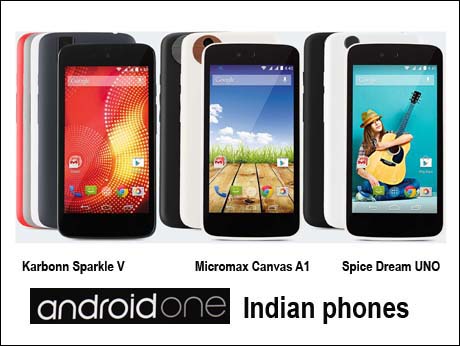
Automatic software updates are great, but do you want the Google bear-hug that goes with it?
An IndiaTechOnline special
October 6 2014: Google chose to launch the first phones manufactured to its Android One platform in India: three Indian handset makers came on board to roll out phones to the Android One specifications, all priced around Rs 6400 -- Rs 6500 and each tying up with a different online retailer for initial sales: the Karbonn Sparkle V available at Snapdeal; the Micromax Canvas A1 at Amazon; and the Spice Dream UNO at Flipkart.
The Android One phones run the latest version of Android ( currently, it is 4.4 KitKat). They will be some of the first phones to get the new 'Android L' release later this year — an update that will offer improved battery life, enhanced security features, and smarter notifications. In future Android One phones will be automatically updated with the latest OS.
In terms of hardware, all the phones feature front-and rear-facing cameras, 4 GB ROM, 1 GB RAM an identical quad-core processor from MediaTek, a microSD card slot for additional storage, as well as features important to Indians, like dual SIM slots and an FM radio tuner. Google apps such as Gmail, Google Maps, YouTube, Google Search, and Google Translate will come pre-loaded on the phones. So what's the big deal for customers here?
Google says a data compression feature on Android One’s Chrome browser will help squeeze the data flowing between the phone and the Internet, thus helping to keep Net access bills down. In coming weeks, much of YouTube content will be available offline in India, which means people can download videos from YouTube when they are on WiFi and enjoy them later — great for re-watching videos without using up the data plan. Indians will applaud this. But this feature is unlikely to be limited to Android One phones.
We had a chance to try out one of the Indian Android phones and while it is a nice enough experience, we can't honestly say it felt much different from any other Android phone of similar vintage and OS version. Android One design is said to be frugal in its use of RAM -- around 300 MB when idle -- but these are things that most users can't feel.
The main advantage would seem to be tighter control exercised by Google on the specifications, thus assuring buyers of a minimum standard. But let's face it: not all innovation has to come from Google -- Chinese makers have mastered the art of tweaking Android, overlaying their own graphical interface to make phones even more useful and intuitive -- remember the Xiaomi MI3 and RedMi?
The problem with dominant players like Google straddling hardware, software and Internet is that handset designs like Android One, corner users into patronizing the Google avatar of everything from email, search, storage, social media, you name it.
This is not unique to Google. Buy a Windows 8 tablet and you are asked for your Windows Live ID. Buy an Amazon Kindle and the only online shop it leads you to, is -- surprise, surprise -- Amazon. So now, do you want the Android One bear hug?
After howls of protest, Google no longer requires new Gmail users to sign up for a Google+ account. But I am afraid the undeniable advantages of standardization that Android One offers, has a downside: We suspect manufacturers have to follow templates where Google apps have to be played up, if they want the Android One chhaap of approval.That may also explain why feature for feature, Android One phones seem to be costlier than plain vanilla phones.
No one's complaining it seems: Acer, Alcatel Onetouch, ASUS, HTC, Intex, Lava, Lenovo, Panasonic and Xolo, as well as chipmaker Qualcomm, may soon sign up under the Android one banner. But nobody is going to ask us, the customers, what we really want.